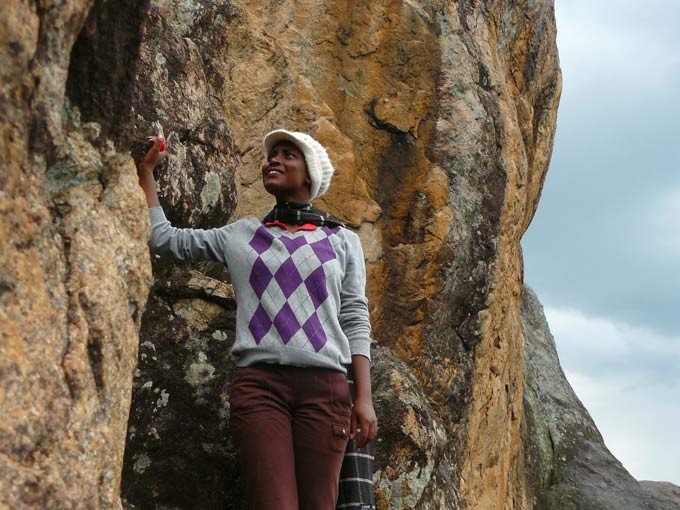
Ngwatilo Mawiyoo, Chela Songok, 2012.
This is the second portion of a two-part report. To read the first, click here.
The Chela I meet is 16, and a hotstepper; fashionable, witty, much cooler than I was at her age, with an enviable ability to flick off advances from the local boys and still become friends with them. Chela is completely uninterested in relationships with the local girls, to her mother’s chagrin. She’s the one I spend the most time with while I’m in Turbo, seeing it through her eyes, and hearing it on her swift tongue, as I inhabit her relationships and haunts alongside her.
She tells me what happened, in passing, on my fifth day in Turbo, while we walk back home in the late afternoon, after rain has fallen. We’re talking about how much of a tomboy she is; I tell her she must get it from her older brother, meaning her surviving brother. She says, “By the way nilikuwa na brothers wawili, lakini mmoja alikufa [I had two brothers, but one died].” We’re speaking something between Kiswahili and Sheng; that lively mix of English and Kiswahili that young people typically speak. When I ask her about it with the microphone on, she begins to relive that time and all but loses her composure. The cracks in her façade begin to show. I feel bad for exposing her.
Violence is not in the blood. But its use has become systemic.
According to the Waki Report, produced by the Commission of Inquiry on Post-Election Violence, the larger Uasin Gishu district—in which Turbo and other “hotspots” are situated—was the epicenter of the violence in the North Rift region. Uasin Gishu District, now Uasin Gishu County, comprises 3,345 square kilometers of mostly farm and forestland and hosts a population of just under one million. During the violence, 272 people died, 21,749 were displaced, and 52,611 houses were burnt, from this county alone.
When I travel to the police station in Eldoret to ask for statistics about the dead, displaced and injured, an officer accuses me of inciting. He’s half-serious. How can you go asking people about that period, won’t you just make them angry again?!
On television while I am in Turbo, we hear news of a massacre in Tana River County, of fighting between the Pokomo and Orma communities. Fifty-two people are killed in an early morning raid on August 22, in the village of Riketa. The dead are men, women and children. The carcasses of 300 cattle are strewn across the village. They say it’s the most violent incident in Kenya since 2007–2008. There is no hiding the fact that the root of the violence is political.
On the evening news, a man from Riketa gives an interview. His wife has been killed, leaving him with three young children to care for, alone and displaced. He says he knows the man who killed his wife; the man even slept in his home not once but three times before. He wants to know how he can be asked to forget a thing like this, to forgive a man like that.
The Waki Report claims several factors were at the root of the violence of 2007–2008. First was the growing use of violence for political ends since multi-party democracy was restored in 1991, increasing competition among the political elite. Second, the personalization of the president’s power has led the population to view access to state resources as contingent on the leader’s ethnic group. Such thinking has worked to reduce the perceived legitimacy and actual efficacy of state institutions. Third, many parts of the populace feel that they have been marginalized throughout history, as far as land and state resources are concerned, and politicians prey on these fears. Fourth is the increasing number of unemployed youth who join organized gangs and militia.
The Waki Report asserts that these factors have dovetailed to create the present situation, in which violence is routinely used to resolve political differences and obtain political power. It concludes: “The violence surrounding elections has been ethnically directed, [which] has increased distrust among different groups and vastly eroded any sense of national identity.”
——
Kenyans are warm, generous people. Mrs. Mwanzo, a schoolteacher originally from the former Western province—now Kakamega County—has taught at Turbo Girls’ High School together with her husband for more than 19 years. Never mind that her house was completely vandalized as she took shelter in Kakamega County when hell broke loose in Turbo: She knows the Nandi to be kind and giving.
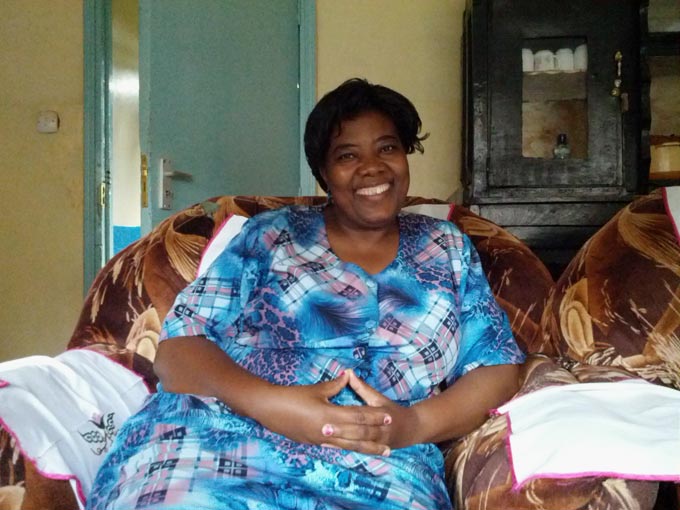
Ngwatilo Mawiyoo, Mrs. Mwanzo at her home in Turbo, 2012
I experience the same during my short stay, and not just from my host family. Chela and I go hiking one day, walking from home to the base of a hill in Tapsagoi area. We mean to climb it. Chela rarely comes this way and so we stop to ask directions. An older man gets up, suspending the conversation he is having with other menfolk, and walks us to his gate. He says we may access the path through his land and then he instructs his nephew to accompany us and act as guide and “bodyguard.” The nephew and his friend, both in their late teens and early twenties, oblige. The old man does all this without recognizing Chela’s family name or knowing either of us from Adam. When we descend some hours later, it begins to rain. We take shelter at the old man’s home, and his wife gives us sweetened tea and roasted maize.
——
Violence is not in the blood. But its use has become systemic. The 2010 enactment of our new constitution has therefore been our most positive action to date. For the first time, power rests solidly in the hands of the people. Already, the judiciary has been transformed, executive powers have been checked, and a new electoral institution is in place. But the biggest change is in the new voices you hear, whose aspirations for the country now have grounding in law, and who encourage ordinary people to try out the new possibilities we now share.
Still, there’s a saying in Kiswahili: The child of a snake is a snake. The language and methods of the political elite still hold the country and its people hostage; those in power may be unable to change themselves. Therefore the people must not be prey, and instead must become snake charmers.
There’s a saying in Kiswahili: The child of a snake is a snake.
For now, in Turbo, there are numerous initiatives to try to curb future violence. From one of the churches, a group consisting of a member from each community travels from door to door, preaching peace. Another church holds regular peace-building seminars with local youth. My host father helps me get a meeting with William Kiprikin Kuto from the Tapsagoi Council of Elders. He says the youth have finally decided to listen to their elders, and elders cannot instruct them toward violence because they hate it. He is confident peace will prevail, at least in this area.
Mr. and Mrs. Mwanzo of Turbo Girls’ High School are not taking any chances. They have found a house eight kilometers away from Turbo, firmly in Kakamega County. They will continue to teach at the school, but they prepare for the worst. Their three sons are upset about the move; they would rather continue living in the school, with the friends and comrades they have always had in their neighbors’ children.
To date, no Kikuyu teacher has returned to the school since the eight who taught there left in 2008. The Kikuyu who remain in Turbo live in a homogenous community at a place called Spring Park.
The Songok family keeps on. Their eldest son is in college in Nairobi. He doesn’t like to come home very often. Chela is in high school near Webuye, farther west, in boarding school. She wants to become a journalist one day, like her cousin in Nairobi, and learn Maasai in spite of the fact that she can barely speak Nandi. When she’s home for the holidays, she listens to the daily shenanigans of the boys, and tries to otherwise distract herself.
Milkah keeps the family going with her business, selling retail maize in the local and surrounding markets and wholesale to the millers in Eldoret, depending on the season. She leaves early and returns after dark; she knows her family will not raise itself.
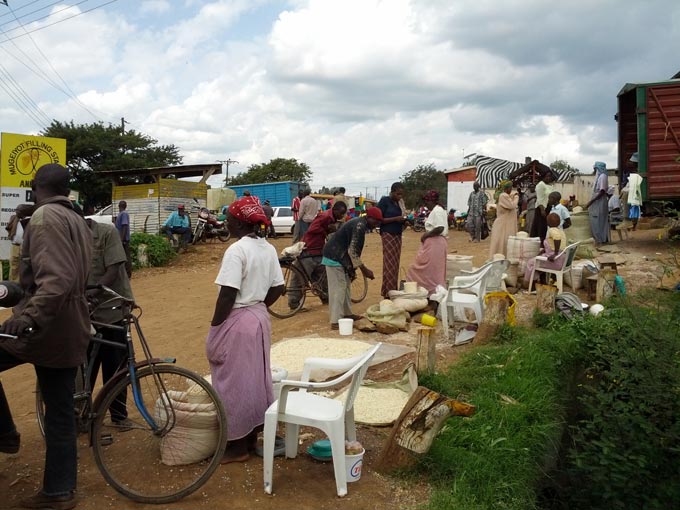
Ngwatilo Mawiyoo, Maize sellers at the market in neighboring Kipkaren town, 2012.
In Nairobi, police and security reform is late, but on the way. In September the Independent Electoral and Boundaries Commission (IEBC) successfully held its first special elections. IEBC says it is ready for the general elections on March 4, 2013. The politicians carry on with their shenanigans, not unlike the boys in Turbo.
As for me, I become Facebook friends with the boys at Tapsagoi. I post the pictures we took when we were on that hilltop, looking down at Nandi, several boys playing among the rocks beside us. All you can see is maize stalks and tassels for miles around, grass-like; a sprinkle of tin roofs catching the light. The commotion in the souls below does not reach you; the memory of the dead does not cause distress. Far ahead in the distance, the lower slopes of Mt. Elgon are only just visible, hidden in a wispy skirt of clouds. You promise the wind you will return, when the sky is clear.
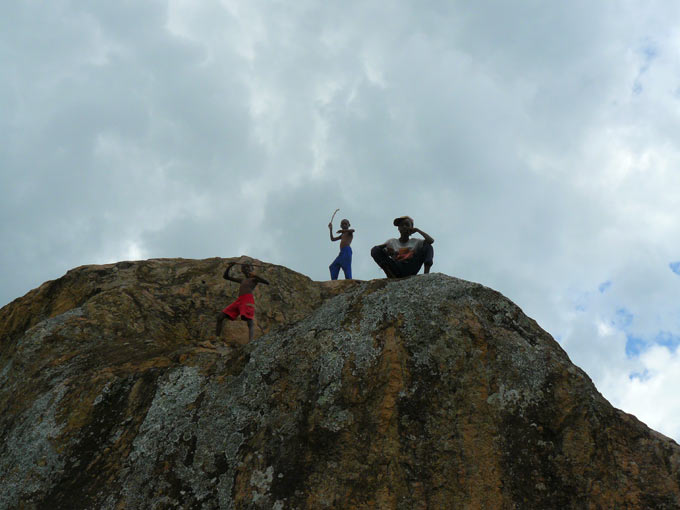
Ngwatilo Mawiyoo, Boys pose on the hill in Tapsagoi, 2012.
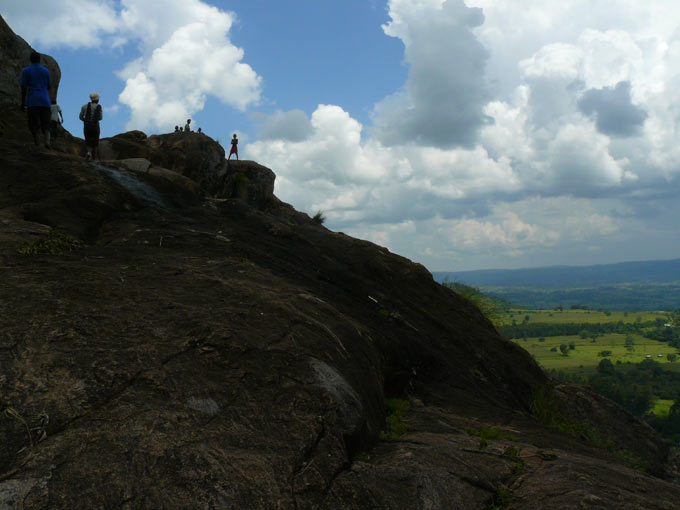
Ngwatilo Mawiyoo, Tapsagoi hillside, 2012.

